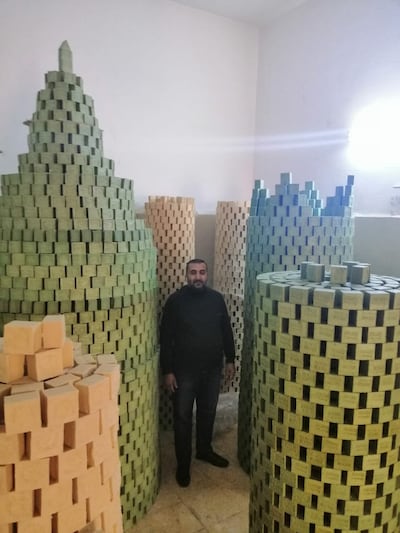Jordanian wholesaler Amer Abu Al Samen used to buy tonnes of Syrian laurel soap before the 2011 conflict restricted imports of the product, made and cut by hand in the ancient city of Aleppo.
Having lost his suppliers, Mr Al Samen took tips from a Syrian chemical engineer to manufacture the soap on his own in Amman.
Once the engineer told him its main ingredient was frying oil, Mr Al Samen realised that he had been importing very low-quality soap from Syria.
“I bought drums of it to start the manufacturing and the smell was disgusting," Mr Al Samen says. “I said to myself that I cannot do this and started to make improvements.”
His products, which were primarily a Syrian speciality a decade ago, indicate how some Jordanian businesses have been adapting to shortages in Syria by making the goods themselves.
Mr Al Samen's soap contains palm and other vegetable oils imported from Malaysia and — depending on the customer — anywhere from 4 per cent to 25 per cent Syrian laurel oil, the prized ingredient.
Each bar weighs about 200 grams and he sells the soap wholesale for $6 a kilogram.

He caters mainly for a large segment of the Jordanian population who cannot afford high-end soap but still want a product more distinctive than what is mass produced for supermarket shelves.
For hundreds of years the ultimate soap in the Levant, and even in Europe, was the Aleppo soap, or the green Savon d’Alep.
In its purest form it is made of a mix of the so-called noble oils: olive and laurel, as well as a soda agent to harden the mix, which is dried for months.
Laurel oil is a natural cleanser, while olive oil is a moisturiser. Both trees have long been cultivated in the hinterland of Aleppo.
The city of craftsmanship and Silk Road fame was heavily bombed by Russian and Syrian planes after it partially fell under the control of rebel groups who were fighting President Bashar Al Assad's forces in 2013.
The Crusaders are said to have introduced the Aleppo soap to Europe. During the French mandate over Syria from the 1920s to the 1940s, Aleppo workshops influenced the production techniques of soap produced in Marseilles and other areas of southern France.
Since Syria’s transformation to socialism in the middle of the last century, cheap imitations of the soap became widespread in the country. This was because of poor enforcement of standards and low-quality production by state-owned factories that undermined the sector.
By the time the Syrian revolt against five decades of Assad family rule erupted in March 2011, very few of the Aleppo family workshops still made the highest-quality soap.

But the allure of the city’s laurel soap remains, although most of the Aleppo soap on the market contains only a fraction of olive and laurel oil ingredients.
“No one would be able to afford the soap if I made it only from olive and laurel, especially with the spike in prices for raw materials,” Mr Al Samen says.
He says the price of Syrian laurel oil jumped from $14 a kilogram to $56 in the past two years, adding that transport from Syria has become very difficult because of the country's fragmentation and uneasy ties with Jordan.
Jordan has no significant production of laurel.
Mr Al Samen makes other soaps from essential oils, such as lavender. He buys most of these oils from a woman who in recent years started her own factory on the outskirts of the Jordanian capital, taking advantage of the shortages in Syria.
“The quality of production of her factory is excellent,” Mr Al Samen says.
His entry into the soap business started when he opened a spice shop in downtown Amman in the 1990s. He quickly found out that the business was much more complicated than he thought.
He stumbled upon the number of a prominent spice dealer in Cairo and phoned him, asking if he could spend some time at his shop to learn the trade.
“He said yes, if you buy from me,” says Mr Al Samen, who travelled numerous times to Cairo in the 1990s and spent a week each time at the shop of the dealer there.
He also started going to Aleppo to buy soap, which he later discovered was not so good, although his customers bought it.
“Tastes in Jordan have improved,” he says. “But people still want something affordable.”


